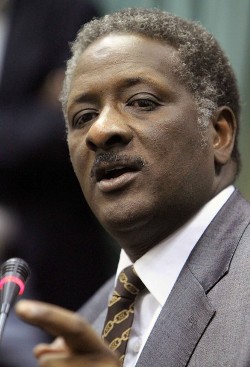Sudan inflation up by 21% in Q1 2012
May 3, 2012 (WASHINGTON) – The inflation rate in Sudan rose to 21% the first quarter of 2012 compared to 16% for the same time period last year, the Sudanese finance and national economy minister Ali Mahmood Abdel-Rasool reporyed today.

Omer Mohamed Saleh, spokesman of the council of ministers, said the main challenges facing the country are economic sanctions and the non-collection of oil transit fees from South Sudan estimated at 6.9 billion pounds.
He also cited the continuation of fuel subsidies costing the budget 490 million pounds and new spending on the military conflict with South Sudan that erupted in late March.
In July 2011, South Sudan became an independent state and took with it 75% of the country’s oil production worth billions of dollars.
Khartoum was hoping that it could make up for that by charging Juba around $36 per barrel to transport its oil through the pipelines running all the way to Red Sea port.
But the landlocked south refused the figure proposed by Sudan and the dispute escalated to the point where Juba decided to suspend oil production that went into effect earlier this year.
This compounded by loss of oil revenues and decline in foreign currency reserves led to sharp weakening of local currency against the dollar making imports more expensive.
The finance minister said the variance between the official exchange rate and black market went up to 55.5% compared to 8.8% last year which he blamed on speculators as well as oil revenue loss.
Nonetheless, Abdel-Rasool projected a 2.2% growth rate in 2012 which contrasted sharply with the forecast of the International Monetary Fund (IMF) made last month of -7.3%.
The IMF also expected consumer prices in Sudan to increase by 23.2% in 2012 and 26.0% in 2013, which is the highest in the Middle East region.
The economic woes of Sudan were made worse by the battles that broke out with South Sudan in April over the oil-rich region of Heglig which produces half of the country’s output of 115,000 bpd.
Despite the reported damage, the government announced this week that the facilities has been repaired and that oil production resumed. It is not clear however if it returned to pre-April levels of 55,000 bpd.
The government is reportedly moving towards lifting subsidies on fuel to ease budget burden, a move strongly resisted by the labor union. Sudanese officials gave conflicting signals on when they intended to implement it.
(ST)
